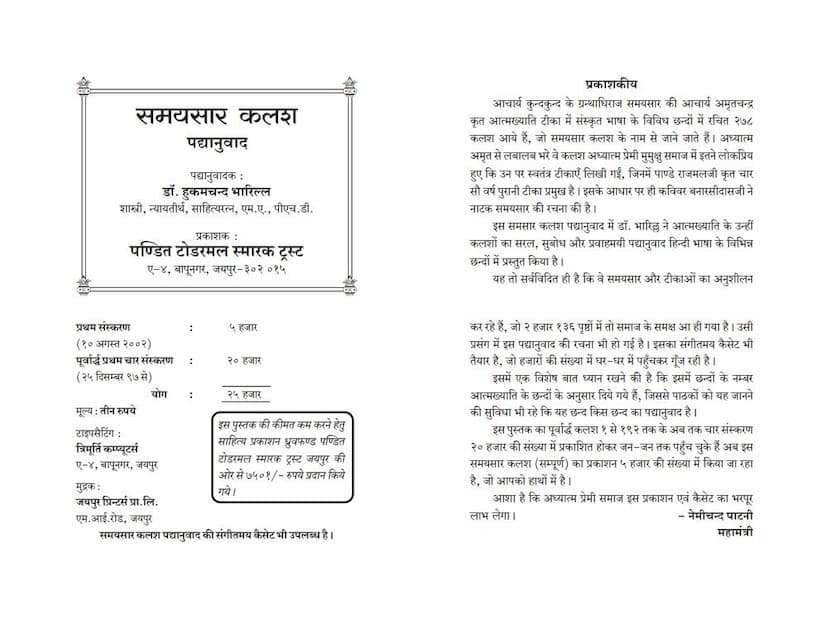Samaysara Kalash Padyanuwada
Added to library: September 2, 2025

Summary
Here's a comprehensive summary of the provided Jain text, "Samaysara Kalash Padyanuwada," in English:
Book Title: Samaysara Kalash Padyanuwada (A Vernacular Rendering of the Samaysara Kalash in Verse) Author: Dr. Hukamchand Bharilla Publisher: Todarmal Granthamala Jaipur
Overview:
This book is a Hindi poetic translation of the Samaysara Kalash, a collection of 278 verses originally composed in Sanskrit by Acharya Amritchandra. These verses are a commentary on Acharya Kundakunda's seminal work, Samaysara. The Samaysara Kalash is renowned for its profound spiritual content, providing a rich nectar of spiritual wisdom. Its popularity has led to independent commentaries, with the work of Pandeya Rajmalji being particularly significant, having inspired Banarasidasji's Natak Samaysara.
Dr. Hukamchand Bharilla, in this Padyanuwada, presents a simple, comprehensible, and flowing Hindi poetic rendition of the Kalash verses as explained in Acharya Amritchandra's Atmakhyaati commentary. The numbering of the verses in this translation corresponds to the original Kalash numbers in Atmakhyaati, allowing readers to easily cross-reference.
Key Themes and Content:
The book is structured into chapters that likely cover the core philosophical concepts of Jainism as expounded in Samaysara, including:
- Jivajiva Adhikara (Chapter on Soul and Non-Soul): This section likely delves into the fundamental distinction between the soul (Jiva) and non-soul (Ajiva) entities, defining the essence of the soul as pure consciousness and identifying it as the sole object of pursuit.
- Kartakarma Adhikara (Chapter on Doer and Action): This chapter addresses the intricate relationship between the doer (Karta) and the action (Karma). It emphasizes that the soul, being pure consciousness, is not the doer of karmas. The perception of being a doer stems from ignorance and mistaken identity. The text clarifies that actions (karmas) are transformations of matter (pudgala), and the soul, by its nature, does not undergo these transformations. The concept of the soul's true nature as unattached and non-involved in actions is highlighted.
- Punyapapa Adhikara (Chapter on Merit and Demerit): This section likely discusses merit (punya) and demerit (papa) as consequences of actions. However, from the perspective of ultimate reality, both are seen as karmic bondage, and the true goal is to transcend them by realizing the pure soul.
- Asrava Adhikara (Chapter on Influx): This part would explain the influx of karmas into the soul, which occurs due to passions like attachment, aversion, and delusion. It would highlight that this influx is the root cause of transmigration and suffering.
- Samvara Adhikara (Chapter on Stoppage): This chapter would focus on the means of stopping the influx of karmas. This involves controlling the senses, mind, and speech, and cultivating right faith, knowledge, and conduct. It emphasizes the importance of self-restraint and preventing the entry of new karmic matter.
- Nirjara Adhikara (Chapter on Shedding of Karmas): This section would discuss the process of shedding or eliminating accumulated karmas. This is achieved through austerities, penance, meditation, and the unwavering realization of the true nature of the soul, which weakens and ultimately eradicates past karmic bonds.
- Bandha Adhikara (Chapter on Bondage): This chapter would further elaborate on the mechanisms and nature of karmic bondage, explaining how various types of karmas attach to the soul due to its ignorant state and passions.
- Moksha Adhikara (Chapter on Liberation): This is the ultimate goal, explaining the state of liberation or salvation. It describes the soul's attainment of its pristine, pure, and blissful state, free from all karmic impurities and the cycle of birth and death.
- Sarvavishuddha Jnana Adhikara (Chapter on Pure Knowledge): This chapter likely focuses on the nature of pure, omniscient knowledge that is inherent in the liberated soul.
- Parishishta (Appendix): This might contain supplementary material, indexes, or further explanations.
Key Philosophical Points Elaborated in the Excerpts:
- The True Nature of the Soul: The soul is consistently described as pure consciousness, full of knowledge and bliss, and distinct from the physical body and all external objects. It is characterized as formless, eternal, and unchanging in its essence.
- The Role of Nayas (Perspectives): The text frequently references different nay as (standpoints or perspectives) – particularly the Shuddha Naya (pure perspective) and Vyavahara Naya (conventional or practical perspective). It emphasizes that while the vyavahara naya might describe the soul in relation to actions or the body, the ultimate truth lies in the shuddha naya, which reveals the soul's unadulterated, detached nature.
- Transcendence of Dualities: The verses advocate for transcending dualities like doer/action, subject/object, bondage/liberation, and even the perceived duality of different nayas. The ultimate realization is the oneness of the soul's pure consciousness.
- Ignorance as the Root Cause: Ignorance (ajnan) and the resulting passions (kashayas) are identified as the primary causes of karmic bondage and suffering. The path to liberation lies in dispelling this ignorance through right knowledge.
- The Power of Self-Experience: The text stresses the importance of direct self-experience (svanuubhuti) and deep contemplation of the soul's true nature.
- Critique of External Practices: While acknowledging the conventional paths, the verses subtly suggest that liberation is not achieved solely through external rituals or practices, but through the internal realization of the soul.
Significance and Purpose:
The Samaysara Kalash Padyanuwada serves as an accessible gateway for Hindi-speaking spiritual aspirants to engage with the profound teachings of Samaysara. By rendering these complex philosophical concepts into beautiful and evocative poetry, Dr. Bharilla makes this essential Jain scripture more relatable and inspiring for a wider audience. The book aims to guide readers towards self-realization and the ultimate goal of liberation.
Publisher's Note:
The publisher's note indicates the extensive reach and positive reception of this work, mentioning the availability of musical cassettes and the high number of copies printed, underscoring its significant contribution to Jain spiritual literature. The foundation's support for making the book affordable is also highlighted.